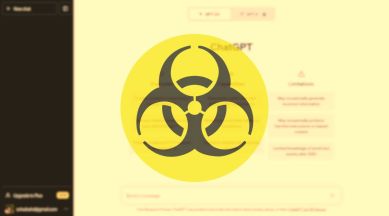
[ad_1]
Anthropic CEO Dario Amodei testifies earlier than US Senate that AI techniques pose a considerable threat of making bioweapons and different harmful weapons within the close to future.

The generative AI panorama has been evolving quickly since ChatGPT’s debut in November final yr. Despite the rising considerations from regulators and specialists, many new chatbots and instruments have emerged with enhanced capabilities and options. However, these chatbots might also pose a brand new menace to world safety and stability.
Dario Amodei, the CEO of Anthropic, warned that AI techniques may allow criminals to create bioweapons and different harmful weapons within the subsequent two to a few years. Anthropic, an organization based by former OpenAI staff, just lately shot into the limelight with the release of its ChatGPT rival, Claude.
The startup has reportedly consulted with biosecurity specialists to discover the potential of huge language fashions for future weaponisation.
You have exhausted your
month-to-month restrict of free tales.
To proceed studying,
merely register or check in
Continue studying with an Indian Express Premium membership beginning Rs 91 monthly.
This premium article is free for now.
Register to learn extra free tales and entry provides from companions.
Continue studying with an Indian Express Premium membership beginning Rs 91 monthly.
This content material is unique for our subscribers.
Subscribe now to get limitless entry to The Indian Express unique and premium tales.
At a listening to on Thursday, Amodei testified earlier than a US Senate expertise subcommittee that regulation is required desperately to sort out the usage of AI chatbots for malicious functions in fields corresponding to cyber safety, nuclear expertise, chemistry, and biology.
“Whatever we do, it has to happen fast. And I think to focus people’s minds on the biorisks, I would really target 2025, 2026, maybe even some chance of 2024. If we don’t have things in place that are restraining what can be done with AI systems, we’re going to have a really bad time,” he testified on the listening to on Tuesday.
This isn’t the primary time an AI firm has acknowledged the hazards of the product they’re themselves constructing and known as for regulation. For occasion, Sam Altman, the top of OpenAI, the corporate behind ChatGPT, urged for worldwide guidelines on generative AI throughout a go to to South Korea in June.
In his testimony to the senators, Amodei mentioned that Google and textbooks solely have partial data for creating hurt, which wants a variety of experience. But his firm and collaborators have discovered that present AI techniques might help fill in a few of these gaps.
“The question we and our collaborators studied is whether current AI systems are capable of filling in some of the more difficult steps in these production processes. We found that today’s AI systems can fill in some of these steps – but incompletely and unreliably. They are showing the first, nascent signs of risk.”
He went on to warn that if applicable guardrails aren’t launched, AI techniques will have the ability to fill in these lacking gaps fully.
“However, a straightforward extrapolation of today’s systems to those we expect to see in two to three years suggests a substantial risk that AI systems will be able to fill in all the missing pieces, if appropriate guardrails and mitigations are not put in place. This could greatly widen the range of actors with the technical capability to conduct a large-scale biological attack.”
Amodei’s timeline for the creation of bioweapons utilizing AI could also be a bit exaggerated, however his considerations aren’t unfounded. Deeper data for creating weapons of mass destruction corresponding to nuclear bombs often rests in categorized paperwork and with extremely specialised specialists however AI may make this data extra extensively obtainable and accessible.
It’s unclear precisely what strategies the researchers used to elicit dangerous data from AI chatbots. Chatbots like ChatGPT, Google Bard, and Bing chat often keep away from answering queries that contain dangerous data, corresponding to the way to make a pipe bomb or napalm.
However, researchers from Carnegie Mellon University in Pittsburgh and the Centre for AI Safety in San Francisco just lately found that open-source systems can be exploited to develop jailbreaks for popular and closed AI systems. By including sure characters on the finish of prompts, they may bypass security guidelines and induce chatbots to provide dangerous content material, hate speech, or deceptive data. This exhibits that the guardrails aren’t foolproof.
Moreover, these risks are amplified by the growing energy of open-source massive language fashions. An instance of AI techniques getting used for malicious purposes is FraudGPT, a bot making a buzz at nighttime internet for its capacity to create cracking instruments, phishing emails, and different offences.
© IE Online Media Services Pvt Ltd
First printed on: 29-07-2023 at 18:55 IST
[adinserter block=”4″]
[ad_2]
Source link